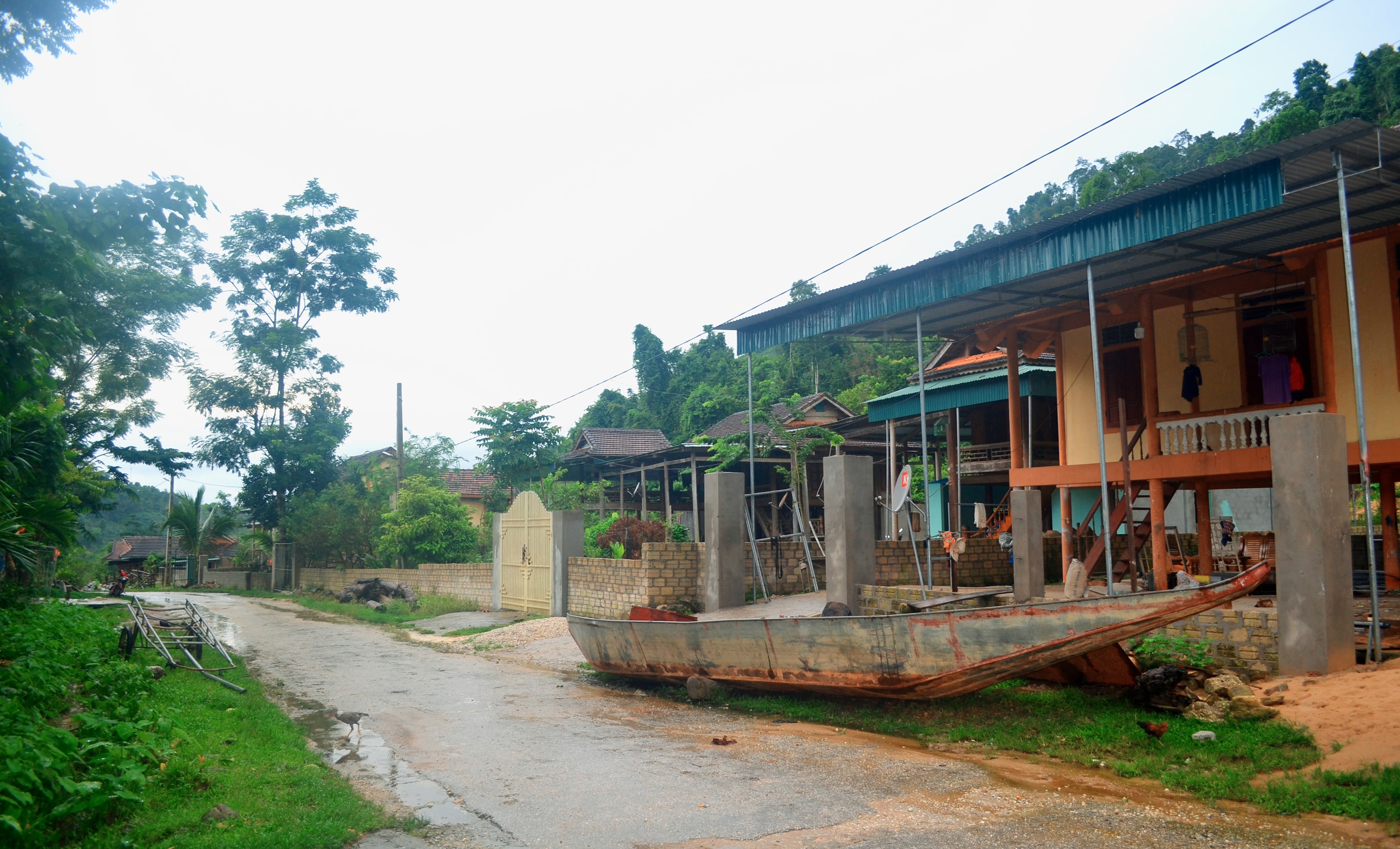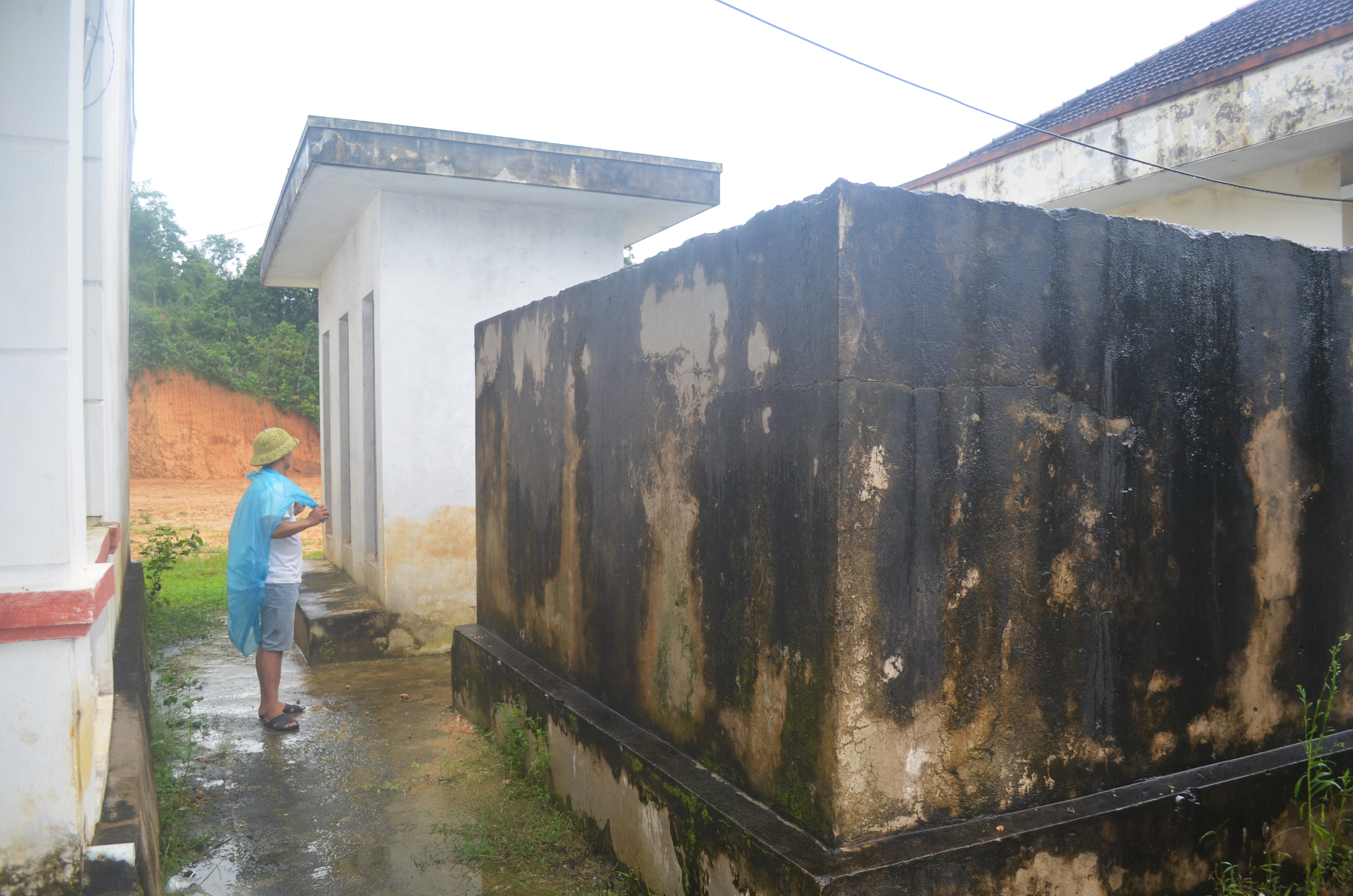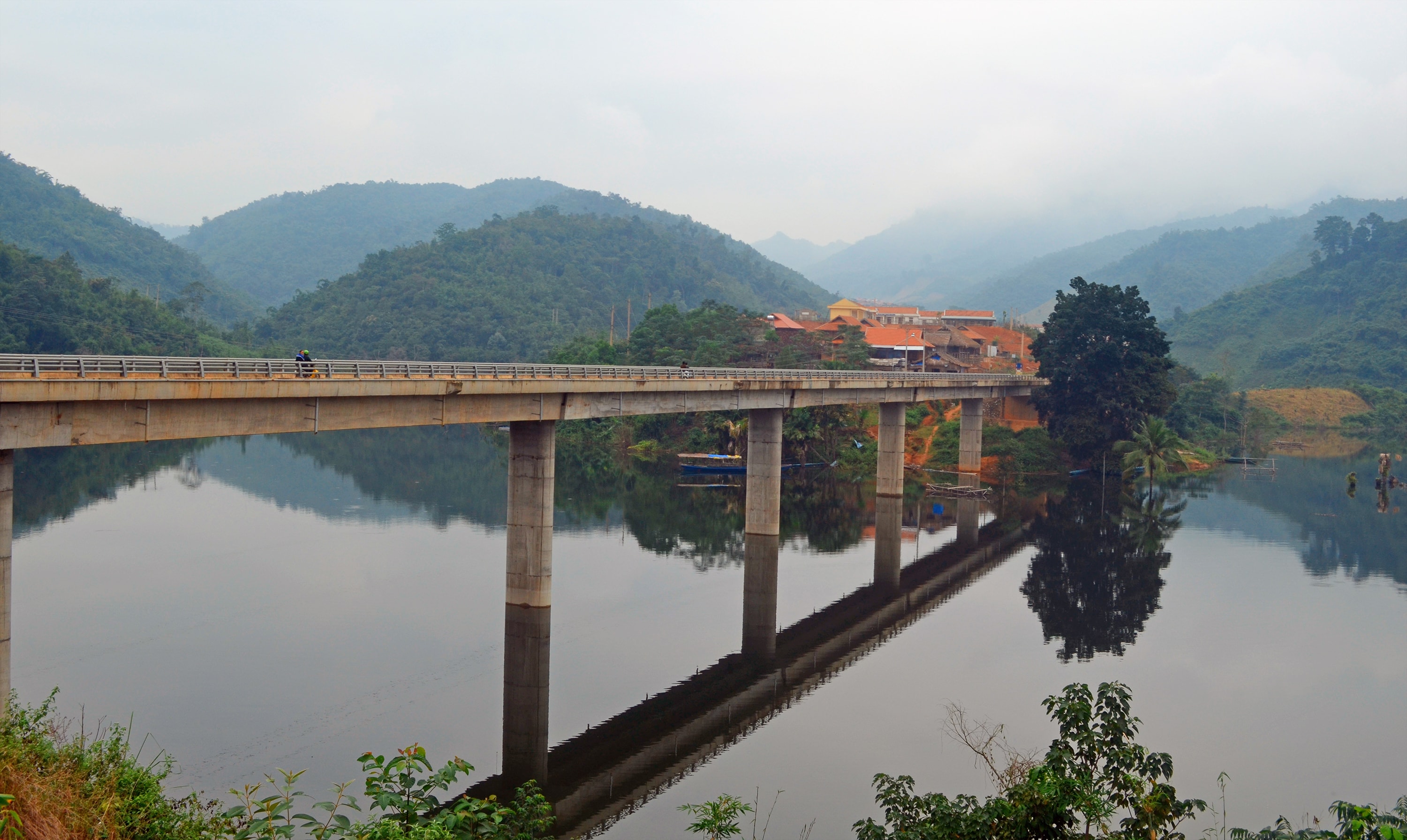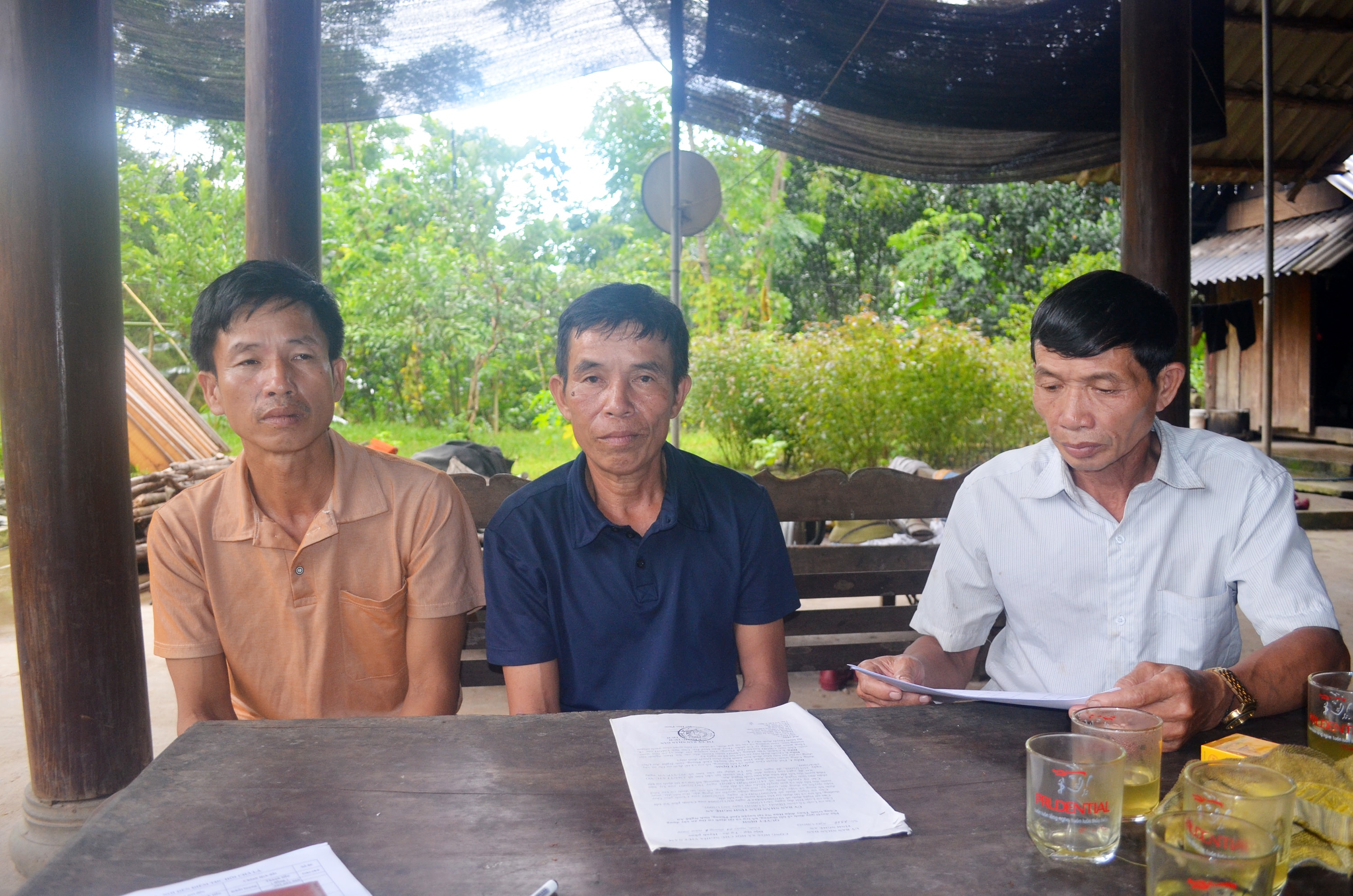Need to ensure fairness for households resettled in Hua Na Hydropower Plant
(Baonghean) - Operating since 2013, but up to now, the Hua Na Hydropower project still has problems and backlogs in compensation, support and resettlement.
Petition from Huoi Cha La
Huoi Cha La is the name of the resettlement site for 30 households in Pieng Van village, Dong Van commune, Que Phong border district. Coming here in early September 2019, meeting Mr. Lang Van Thai - Head of Pieng Van village, he started the conversation with not so happy information, saying: "At the Huoi Cha La resettlement site, there are many things that people want to send to their superiors, so that their superiors can tell Hua Na Hydropower Plant to resolve...".
That's why, although he didn't want to, Mr. Lang Van Thai and Party Secretary Lo Hong Ngan, on behalf of the Huoi Cha La people, wrote a petition to the Chairman of the District People's Committee and the Compensation, Support and Resettlement Council of the Hua Na Hydropower Project.
 |
| Huoi Cha La resettlement site. Photo: Nhat Lan |
The petition stated: Pieng Van village relocated from the Hua Na Hydropower Reservoir to a new residence in 2012, and many items have not been compensated yet. It is requested that the Chairman of the District People's Committee direct relevant departments to promptly return the following items: Types of land that have not been compensated: Land 163 of 12 households, some areas have been permanently flooded, and have not been compensated yet. Rice fields of households that were completely flooded have not been compensated. There are 8 households that did not register to receive fields from the project and have not received support money. Agricultural land for growing annual crops has not been deducted from the place of departure and place of arrival. In addition, the petition added the following contents: Request to install a water pipe system to the toilets of the community cultural house and school; build a village temple and soccer field; repair the dam containing domestic water due to erosion.
Village chief Lang Van Thai said that Pieng Van village has 30 households that were relocated from their birthplace in 2012 to Huoi Cha La for the construction of the Hua Na Hydropower Plant. Currently, the village has up to 40 households. However, the people have not received all that is due to them. Meanwhile, the rice support from the project has stopped, so the people are facing many difficulties.
“No matter how difficult it is, we must overcome it. We must raise livestock and poultry, then go into the forest to collect forest products to make a living. But we request that all the people’s petitions be resolved. We have waited too long…”
Vice Chairman of Dong Van Commune People's Committee - Mr. Ho Anh Dung, confirmed the contents of the Huoi Cha La resettlement site residents' petitions. At the same time, he said that this is the common situation at the 4 Hua Na Hydropower resettlement sites in the area. Mr. Ho Anh Dung shared: "There are still many issues to worry about at the Hua Na Hydropower project resettlement sites, especially when hearing about changes in the deduction of differences in the value of land use rights for agricultural land types...".
 |
| The toilets of the school and the cultural house of the Huoi Cha La resettlement area have not been used since their construction because water pipes have not been installed. Photo: Nhat Lan |
District concerns
More specifically, Mr. Ho Anh Dung said that in order to pay the difference in value of agricultural land use rights between the place of departure and the place of destination for the people, recently, the People's Committee of Dong Van commune has coordinated with the functional units of the district to review and prepare detailed compensation and support records for each type of agricultural land and forestry land. However, the investor has a document proposing the Provincial People's Committee to implement the plan of deducting the difference in total value of agricultural land types. That means combining all types of agricultural and forestry land to calculate the difference in value. If implemented according to this plan, it will be difficult to get consensus from households because they are disadvantaged. Therefore, Dong Van commune is very concerned...
Hua Na Hydropower Project affects 14 villages in the reservoir area, belonging to Thong Thu and Dong Van communes.
Confirming the information exchanged by Dong Van commune officials, a representative of Que Phong district People's Committee said that the Hua Na Hydropower Project started construction in 2008, affecting 14 villages in the reservoir area, belonging to Thong Thu and Dong Van communes with 1,362 households; of which 484 households were resettled freely, 878 households were resettled under the project.
By the end of 2012, the work of compensation and support for assets on land for households was basically completed. Regarding the allocation of new residential land at the resettlement site for 878 households, up to now, the allocation of residential land, garden land, and adjacent ponds has been completed; 825 households were allocated rice fields (average 200m2/household); 878 households were allocated land for agricultural production to grow annual crops (average 1.07ha/household); 822 households were allocated forestry land (average 3.99ha/household).
According to the regulations on compensation, support and resettlement of the Hua Na Hydropower project issued by the Provincial People's Committee in Decision No. 2327/QD-UBND in 2009, after households have stabilized their lives and production in resettlement areas, the investor must be responsible for paying the difference in land use rights value between the departure and destination places.
In the past, Que Phong district has balanced and deducted the value of land use rights between the departure and arrival places for residential land, garden land, ponds adjacent to residential land and rice fields; and is continuing to direct the development of detailed compensation and support plans for each type of agricultural land and forestry land.
 |
| Under the Hua Na Hydropower Reservoir, there are villages of people from Thong Thu and Dong Van communes. Photo: Nhat Lan |
As for Hua Na Hydropower Joint Stock Company, it has only provided funds to pay compensation and support for the difference in land use rights for residential land and garden land, ponds adjacent to residential land with an amount of nearly 11 billion VND. On May 29, 2019, the Company issued Document No. 280/HHC-KTKH requesting the Provincial People's Committee to guide on how to calculate and deduct the difference in land use rights between the departure and destination places, in which it proposed to calculate and deduct according to the total land use rights value of all types of land for each household.
The above proposal has caused conflicting opinions. On the side of Que Phong district, the opinion is that they disagree. Because they see that it is not in accordance with the provisions of the law, inconsistent in implementing policies, moreover, when people are disadvantaged, it may cause complicated problems... Therefore, the district has sent a written report to the Provincial People's Committee.
“The progress of resolving the backlog in compensation, support and resettlement of the Hua Na Hydropower Project is currently behind schedule compared to the direction of the Provincial People’s Committee, which has led to frustration among the people. However, we need to wait for the Provincial People’s Committee’s opinion on how to calculate and deduct the difference in land use rights value between the place of departure and the place of destination…”
Need to be legal and consistent
On August 14, 2019, the General Department of Land Administration (Ministry of Natural Resources and Environment) issued Document No. 1549/TCQLDD-CKTPTQD to the Department of Natural Resources and Environment to guide the implementation of handling the difference in land use rights value between the departure and arrival places at the resettlement site of the Hua Na Hydropower Project.
The regulations cited by the General Department of Land Administration are: “According to Clause 2, Article 74 of the 2013 Land Law, compensation is provided by allocating land with the same purpose as the type of land recovered. If there is no land for compensation, compensation will be made in cash according to the specific land price of the type of land recovered as decided by the Provincial People's Committee at the time of the decision to recover the land.
 |
| Village Chief Lang Van Thai and Party Cell Secretary Lo Hong Ngan talk about the concerns of the people at Huoi Cha La resettlement site. Photo: Nhat Lan |
The determination of land use purpose of the recovered land type is based on the provisions of Article 10, Article 111 of the Land Law; Article 3, Decree No. 43/2014/ND-CP dated May 15, 2014 of the Government detailing the implementation of a number of articles of the Land Law...
According to the provisions of Clause 5, Article 5 of Decision No. 64/2014/QD-TTg dated November 18, 2014 of the Prime Minister stipulating specific policies on migration and resettlement of irrigation and hydropower projects, the handling of the difference in land value at the departure and destination places is as follows: "If the value of agricultural land assigned is lower than the value of the recovered land, the resettled household will be compensated for the difference in value...".
With these regulations, it can be understood that the deduction of the difference in land use value between the departure and destination places must be separate, specifically for the purpose of use of each type of land. This handling method, as informed by the People's Committee of Que Phong district, is also the method that has been implemented in the past at the Hua Na Hydropower Project. Therefore, it is necessary to be consistent and urgently implemented to ensure fairness for resettled households who have given up land to build the Hua Na Hydropower Plant.
